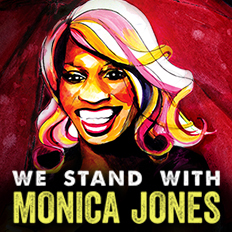-----------------------------
STAND WITH MONICA JONES!
Friday, March 14 8:00am / Phoenix Municipal Court / 300 W. Washington St. PHX 85003
Thanks to Darby Hickey and the Best Practices Policy Project for their support!
-----------------------------
Monica Jones and the Fight Against Racial and Gender Police Profiling in the U.S.
DARBY HICKEYhuffington post
3/12/2014
On March 14, Monica Jones goes to court. She will plead not guilty to manifestation of prostitution. And she will be making history in the process.

Monica is fighting back against a system that normally churns people through the cogs of justice with little resistance. Across the U.S., individuals (most of them women, many of them trans, but men too) arrested and charged on prostitution-related charges usually enter guilty pleas. When evidence consists of a police officer's word against yours, combined with social stigma towards sex workers or those profiled as such, plus overburdened and ill-prepared defense lawyers, you don't go to bat for your own innocence. You take the plea and hope for the best.
But Monica wasn't having that. She was arrested after protesting Arizona's harsh criminal justice system, which includes exceptionally stringent provisions on prostitution. She was protesting a program in Phoenix that ostensibly helps people involved in commercial sex to avoid criminal prosecution and get help, but instead sends the majority of them to jail after they "fail" the program. But as a black trans woman, she might well have been arrested anyway, thanks to a phenomenon we call "Walking While Trans." If you are a trans woman or have ever worked with us, you likely know this phrase. It describes the experience of constantly being harassed and sometimes arrested by police, who assume, simply by your existence as a trans women (particularly if you are a trans woman of color) that you must be engaging in commercial sex. All the time, everywhere.
In other words, "Walking While Trans" is a succinct summation of the interconnected biases against trans women (and trans people more broadly, sometimes called transphobia) and against people who trade sexual services for money or other things (sometimes called whorephobia) and bound up in that special sauce of racism.
The ground-breaking part is how Monica is fighting back against all of this. Her case is emblematic of how law enforcement violates people's civil rights on a regular basis not only in Phoenix but across the U.S. She is challenging the criminalization of herself and her community, the criminalization of trans people and black people and sex workers and people of color.
Monica and other human rights defenders in Phoenix are taking their fight not just to U.S. courts, but also to the United Nations. They have already submitted a report to the UN on the U.S. government's compliance with the International Covenant on Civil and Political Rights (ICCPR). And advocates working with Monica will be in Geneva for the UN Human Rights Council's review of U.S. obligations under ICCPR the same day that Monica will be in court in Phoenix. It will be a day of action to confront racist and sexist policing.
Monica and others are also calling out those who claim to want to help sex workers, by treating people in the sex trade as victims instead of criminals -- and who think arresting sex workers is how you "help" them. New collaborations between police and non-governmental organizations, such as Project ROSE in Phoenix, allege to provide alternatives to incarceration for people involved in sex trade. Perversely, these efforts actually increase the numbers of people arrested under prostitution laws through street sweeps and mass online sting operations. In the case of Project ROSE, part of the process of "helping victims" involves taking them to a church where they interview with police and prosecutors but aren't allowed to speak with defense lawyers. Arrestees all but plead guilty in joining the program, and if they fail to meet attendance requirements -- as 70 percent of them do -- they end up in jail.
The rights violations that police commit in the course of enforcing anti-prostitution and other "quality of life" laws are so pervasive and those targeted so stigmatized that the system is rarely challenged. Which is why Monica's stance is so important.
She is part of a fierce legacy of resistance and resilience. Like countless others who have fought back against discriminatory policing, she has been targeted precisely for speaking out. Monica is fighting for her rights, but she is also acting for the rights of everyone, in Phoenix and across the country, to be free of such abuses. Let's join her in that struggle on March 14th.
Monica Jones illustration by Micah Bazant.
Follow Darby Hickey on Twitter: www.twitter.com/DarbyBPPP